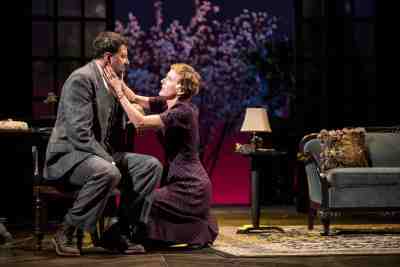WATCH ON THE RHINE
Lillian Hellman’s 1941 drama rings soundly in modern times as a portrait of family and responses to an unjust world
All photos courtesy of the Guthrie Theater
By Lianna Matt
“Watch on the Rhine” takes place in one room, and it’s a beautiful one at that, thanks to set and lighting designers Neil Patel and Alexander V. Nichols, respectively. The coffered ceilings lead back to the living room’s frosted-paned terrace doors; a chandelier illuminates the wood and muted golds and blacks; the furniture whispers old money as a housekeeper moves about it with unhurried familiarity. For Sara Muller, her childhood manor in Washington D.C. is the one safe place she and her family can go to as they flee Nazi Germany, even if it means seeing her mother and brother for the first time in 20 years. Despite the play’s billing as a political thriller, “Watch on the Rhine” is really a portrait of a family learning how to live together again after being worlds apart.
 Originally written to challenge the United States’ complacency during the beginnings of World War II, Lillian Hellman’s 1941 “Watch on the Rhine” script is not a shallow propaganda pitch. Hellman creates characters made rich through memories, details and desires that are strong yet nuanced, and each cast member, under director Lisa Peterson’s careful eye, delivers their best on the Guthrie Theater stage from Sept. 30-Nov. 5.
Originally written to challenge the United States’ complacency during the beginnings of World War II, Lillian Hellman’s 1941 “Watch on the Rhine” script is not a shallow propaganda pitch. Hellman creates characters made rich through memories, details and desires that are strong yet nuanced, and each cast member, under director Lisa Peterson’s careful eye, delivers their best on the Guthrie Theater stage from Sept. 30-Nov. 5.
Sara, her husband Kurt and three children settle into her old home with a few awkward moments, family squabbles and some prying moments from the Romanian count Teck de Brancovis who is also staying as a house guest with his wife. If Sara perhaps gets a bit too cagey about her husband Kurt’s work as an anti-fascist and if perhaps the Muller children arrive a bit too hungry, it is all forgotten in the name of getting along. Caitlin O’Connell plays Sara’s mother Fanny as a histrionic and disapproving mama bear, but Sara (Sarah Agnew) is forgiving despite her feistiness. It helps that Fanny’s son, David (Hugh Kennedy), injects just the right amount of loose confidence and good humor to smooth things over, too.
For some time, the living room—and the Mullers’ world—is filled with contentment, but then Teck becomes desperate for a life he believes the Nazis can give him, and exposing Kurt is leverage he refuses to let slip away. Fanny and David are forced to choose how to respond to the unjust world the Mullers knew all along, and those choices leave deep, self-inflicted wounds: the price of knowing and acting on that knowledge.
After an ending is torn from a dangerous calm, the room, which was so beautiful when the audience first laid eyes on it, is empty, and the air in it hangs heavy. Still, the day, so violently different than its predecessors, ends like any other day.
